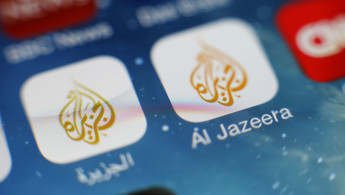Anti-Qatar countries to drop demand on Al-Jazeera's closure
A quartet of Arab countries blockading Qatar could drop a key demand in their 13-point ultimatum, according to media reports.
The demand to close Al-Jazeera news network has already been rejected by Qatar, and could now be withdrawn by the Saudi-led bloc which has worked to isolate Doha.
Instead, Saudi Arabia, the UAE, Egypt, and Bahrain will instead look for concessions from Doha to keep the flagship media enterprise open.
This would include a "fundamental change and restructuring" of the Arabic-language news channel, while the English arm could remain largely untouched.
"The staff at the channel can keep their jobs and Qatar can still fund a TV channel but not one which provides a platform for extremists and where the English channel is a protective shield for the much more radical Arabic one," Noura al-Kaabi, the UAE minister for the federal national council, told The Times, published Thursday.
Critics of the Arabic channel insist that Al-Jazeera English's coverage is more nuanced, while Kaabi praised the network's "professionalism".
Later in the day, Kaabi appeared to have reverted back to the original line of the Saudi-led alliance - that Al-Jazeera must radically change or close.
"Position of Anti-Terror Quartet [Saudi led-alliance] is clear. The platform for extremism that is Al Jazeera MUST END," she tweeted.
"Ppl shouldn't be fooled by the cynical use of principles of journalistic freedom as a cover for hate speech & the incitement of violence," Kaabi continued.
Saudi Arabia, the UAE, Egypt and Bahrain have accused the Arabic-language network of "incitement" following the 2011 Arab Spring revolutions that led to the overthrow of leaders in Tunisia, Egypt, Libya and Yemen.
|
|
Worried that popular unrest could whip on in the Gulf region, regimes ordered a crackdown on dissent, and have worked to undermine Al-Jazeera's reach in the Arab world.
Scores of activists in the Gulf have been jailed, particularly those linked to the Muslim Brotherhood, whose Egyptian wing won the country's first free and fair democratic elections.
Protests by Bahrain's marginalised Shia majority led to a Saudi-led intervention on the island on behalf of the Manama government.
The UAE proposal looks set to be backed by Saudi Arabia, the other key player in the diplomatic and economic blockade on Qatar, which began last month, The Times revealed.
A demand to close Al-Jazeera has been severely backfired, leading to outrage from human rights groups, the UN, and some Western countries.
US Secretary of State Rex Tillerson was in Jeddah on Wednesday where the anti-Qatar bloc also met to discuss their next move following Doha's rejection of the 13-point ultimatum.
"I think Qatar has been quite clear in its positions, and I think those have been very reasonable," Tillerson told reporters.
The UAE minister, meanwhile, hinted that there might be no further action against Qatar or new sanctions, despite previous threats to do so.
"We need a diplomatic solution. We are not looking for an escalation," Kaabi told The Times.
Saudi Arabia, the UAE, Egypt and Bahrain issued a 13-point ultimatum to Qatar last month, which included demands to close a Turkish military base, shuttering Al-Jazeera, and ending relations with Iran.
Qatar called the demands "unreasonable" and said it infringed on its "sovereignty".
French Foreign Minister Jean-Yves Le Drian is in the region to help patch up the crisis - perhaps the biggest in the Gulf Cooperation Council's existence - and which has set three Gulf allies of the US and Europe against one another.
The anti-Doha quartet's attacks on Qatar and Al-Jazeera have been increasingly heavy-handed in recent months.
Saudi and UAE media have launched a media campaign criticising Doha, while Al-Jazeera's channels and websites have been blocked in these countries.
Popular Qatar-based beIN Sports - which screens leading sporting events - has been blocked in the Gulf states with a rival network due to be set up by Saudi Arabia.





 Follow the Middle East's top stories in English at The New Arab on Google News
Follow the Middle East's top stories in English at The New Arab on Google News


